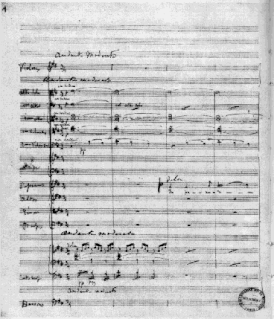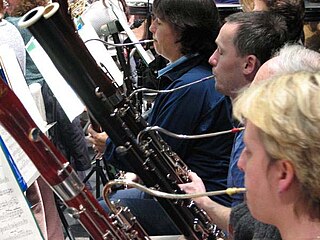Related Research Articles

The War Requiem, Op. 66, is a large-scale setting of the Requiem composed by Benjamin Britten mostly in 1961 and completed in January 1962. The War Requiem was performed for the consecration of the new Coventry Cathedral, which was built after the original fourteenth-century structure was destroyed in a World War II bombing raid. The traditional Latin texts are interspersed, in telling juxtaposition, with extra-liturgical poems by Wilfred Owen, written during World War I.

A Requiem or Requiem Mass, also known as Mass for the dead or Mass of the dead, is a Mass in the Catholic Church offered for the repose of the soul or souls of one or more deceased persons, using a particular form of the Roman Missal. It is usually, but not necessarily, celebrated in the context of a funeral.
The 28th Annual Grammy Awards were held on February 25, 1986, at Shrine Auditorium, Los Angeles. They recognized accomplishments by musicians from the previous year, 1985.

The Messa da Requiem is a musical setting of the Catholic funeral mass (Requiem) for four soloists, double choir and orchestra by Giuseppe Verdi. It was composed in memory of Alessandro Manzoni, an Italian poet and novelist whom Verdi admired. The first performance, at the San Marco church in Milan on 22 May 1874, marked the first anniversary of Manzoni's death. The work was at one time called the Manzoni Requiem. It is rarely performed in liturgy, but rather in concert form of around 85–90 minutes in length. Musicologist David Rosen calls it 'probably the most frequently performed major choral work composed since the compilation of Mozart's Requiem'.
Music of Kazakhstan refers to a wide range of musical styles and genres deriving from Kazakhstan. Kazakhstan is home to the Kazakh State Kurmangazy Orchestra of Folk Instruments, the Kazakh State Philharmonic Orchestra, the Kazakh National Opera and the Kazakh State Chamber Orchestra. The folk instrument orchestra was named after Kurmangazy Sagyrbayuly, a well-known composer and dombra player from the 19th century.
The Grammy Award for Best Choral Performance has been awarded since 1961. There have been several minor changes to the name of the award over this time:

The Requiem in D minor, K. 626, is a requiem mass by Wolfgang Amadeus Mozart (1756–1791). Mozart composed part of the Requiem in Vienna in late 1791, but it was unfinished at his death on 5 December the same year. A completed version dated 1792 by Franz Xaver Süssmayr was delivered to Count Franz von Walsegg, who commissioned the piece for a Requiem service to commemorate the anniversary of his wife's death on 14 February.

A German Requiem, to Words of the Holy Scriptures, Op. 45 by Johannes Brahms, is a large-scale work for chorus, orchestra, a soprano and a baritone soloist, composed between 1865 and 1868. It comprises seven movements, which together last 65 to 80 minutes, making this work Brahms's longest composition. A German Requiem is sacred but non-liturgical, and unlike a long tradition of the Latin Requiem, A German Requiem, as its title states, is a Requiem in the German language.

Gabriel Fauré composed his Requiem in D minor, Op. 48, between 1887 and 1890. The choral-orchestral setting of the shortened Catholic Mass for the Dead in Latin is the best-known of his large works. Its focus is on eternal rest and consolation. Fauré's reasons for composing the work are unclear, but do not appear to have had anything to do with the death of his parents in the mid-1880s. He composed the work in the late 1880s and revised it in the 1890s, finishing it in 1900.

Polish Requiem, also A Polish Requiem, is a large-scale requiem mass for soloists, mixed choir and orchestra by the Polish composer Krzysztof Penderecki. The Lacrimosa, dedicated to the trade union leader Lech Wałęsa, was written for the unveiling of a statue at the Gdańsk Shipyard to commemorate those killed in the Polish anti-government riots in 1970. He expanded the work into a requiem, writing other parts to honour different patriotic events over the next four years. The Polish Requiem was first performed in Stuttgart on 28 September 1984. Penderecki revised and expanded the work in 1993, and expanded it again in 2005 with the additional movement, Ciaccona. It is called Polish Requiem because its parts are dedicated to heroes and victims of Polish history. One of the better-known works by Penderecki, the mass largely follows the liturgical Latin of the requiem format with the addition of Święty Boże, the Polish translation of the Trisagion.
In These Stones, Horizons Sing is a work for chorus and orchestra composed by Karl Jenkins. It was commissioned for the opening of Wales Millennium Centre and first performed at its opening in November 2004. The work includes text in both English and Welsh written by Menna Elfyn, Grahame Davies, and Gwyneth Lewis.
Marat Bisengaliev is a Kazakh violinist and conductor of both the West Kazakhstan Philharmonic Orchestra and TuranAlem Kazakhstan Philharmonic Orchestra. He is the founding Music Director of the Symphony Orchestra of India. In addition, he is head of the Uralsk International Violin Competition. Most of the time he lives and works in the UK and India.

The Symphony Orchestra of India is a symphony orchestra based in Mumbai, India. It was founded in 2006 by the National Centre for the Performing Arts (NCPA), Mumbai, which is also its home.

The string section is composed of bowed instruments belonging to the violin family. It normally consists of first and second violins, violas, cellos, and double basses. It is the most numerous group in the typical Classical orchestra. In discussions of the instrumentation of a musical work, the phrase "the strings" or "and strings" is used to indicate a string section as just defined. An orchestra consisting solely of a string section is called a string orchestra. Smaller string sections are sometimes used in jazz, pop and rock music and in the pit orchestras of musical theatre.
Antonín Dvořák's Requiem in B♭ minor, Op. 89, B. 165, is a funeral Mass scored for soloists, choir and orchestra. It was composed in 1890 and performed for the first time on 9 October 1891, in Birmingham, England, with the composer conducting.

Leeds Symphony Orchestra is one of the oldest established symphony orchestras in the United Kingdom dating back to 1890. It is a non-professional orchestra based in Leeds, Yorkshire, with a membership of around 80 players. Up to ten concerts a year are given at venues including Leeds, Knaresborough, Wetherby and Horsforth. The orchestra's repertoire in recent years has ranged from seventeenth-century music to present-day works.
The history of the Chicago Symphony Chorus began on September 22, 1957, when the Chicago Symphony Orchestra (CSO) announced that Margaret Hillis would organize and train a symphony chorus. Music Director Fritz Reiner’s original intent was to utilize the Chorus for the two weeks of subscription concerts that season, performing — George Frideric Handel’s Messiah in December and Giuseppe Verdi’s Requiem in April. When Bruno Walter informed the Orchestra’s management that his March 1958 appearances would be his last in Chicago the board president Eric Oldberg insisted that Walter conduct Wolfgang Amadeus Mozart’s Requiem utilizing the new Chorus. During that first season, it would have been logistically impossible for Hillis to audition and prepare a new Chorus for three major works within less than four months. As an interim fix the Apollo Chorus of Chicago was used for the Christmas Messiah concerts.
Requiem is a classical work by Karl Jenkins, first recorded and performed in 2005. It was premièred at Southwark Cathedral on 2 June 2005, by the West Kazakhstan Philharmonic Orchestra and Adiemus percussion and brass, conducted by the composer. Soloists were Nicole Tibbels (soprano), Clive Bell (shakuhachi), Sam Landman (treble) and Catrin Finch (harp).

The Requiem by Frederick Delius was written between 1913 and 1916, and first performed in 1922. It is set for soprano, baritone, double chorus and orchestra, and is dedicated "To the memory of all young artists fallen in the war". The Requiem is Delius's least-known major work, not being recorded until 1968 and having received only seven performances worldwide by 1980.

The Requiem, full title Messe de Requiem, Op. 54, is a Requiem Mass composed by Camille Saint-Saëns in 1878 for soloists, choir and orchestra. He composed it in memory of his friend and patron, Albert Libon, and conducted the first performance on 22 May 1878 at Saint-Sulpice in Paris, with Charles-Marie Widor as the organist. It was first published the same year.
References
- Liner notes, Requiem, 2005
| This article on a classical orchestra is a stub. You can help Wikipedia by expanding it. |